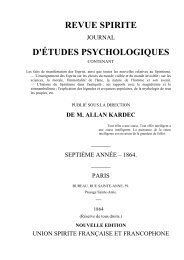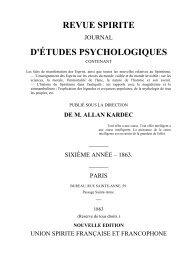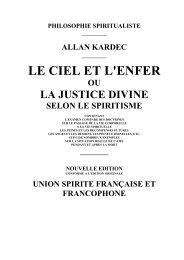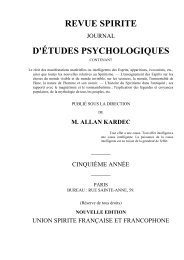PDF version - Geae
PDF version - Geae
PDF version - Geae
You also want an ePaper? Increase the reach of your titles
YUMPU automatically turns print PDFs into web optimized ePapers that Google loves.
CHAPTER XVI<br />
OBJECTIONS AND CRITICISMS<br />
We have responded to many objections regarding the forgetfulness of the past incarnations, but it<br />
remains for us to refute others of a character religious or philosophical, which the churches offer to this<br />
doctrine. They tell us, first of all, that the doctrine is insufficient from the moral viewpoint in opening to man<br />
such vast perspectives in the future, and in leaving to him the possibility of repairing his errors in the lives to<br />
come. It is claimed that vice and indolence are encouraged, and that no stimulant is offered powerful enough to<br />
produce good actions. For these reasons the fear of eternal punishment after death is preferred by the Church.<br />
The theory of eternal suffering was born in the Church (as we have proven in a former work,<br />
Christianity and Spiritism) in order to frighten the wicked. But the menace of Hell, the fear of eternal pain,<br />
efficacious perhaps in the era of blind faith, does not hold the modern mind. It is regarded indeed as an impiety<br />
toward God, which it represents as a cruel Being, punishing His creatures needlessly, without hope of relief. In<br />
its place the doctrine of reincarnation shows the true love of our destinies, and with it the realization of the<br />
progress of justice in the universe. In making known to us the anterior cause of our troubles, it puts an end to<br />
the iniquitous conception of original sin: that is to say, the burdening of humanity entire with Adam’s<br />
weakness. Its moral influence is more profound than that of the childish fables of Hell and Paradise. It offers a<br />
bridle for our passions by showing us the consequence of our present acts on the future in sowing seeds of<br />
sorrow or felicity. It stimulates our efforts toward good by showing us that just in the degree we are culpable,<br />
so will we be unhappy. It is true that this doctrine is inflexible, but it at least proportions the punishment to the<br />
fault, and speaks to us of reparation and hope afterward. The orthodox creed instead imbues us with the idea<br />
that confession and absolution efface sin and prevent man from rectifying his conduct here and preparing<br />
himself carefully for his future Beyond. Another objection offered is, if we are convinced that our evils are<br />
merited, that they are the consequence of a just law, such a belief would have the result of extinguishing all<br />
compassion for others: we would feel less inclined to console and sympathize with our sorrowing fellows. But<br />
modern spirituality teaches us that men are all united by a common fate. The social imperfections from which<br />
we all suffer more or less are the result of collective errors of the past, so each one of us carries his<br />
responsibility and his duty to work for the amelioration of the whole social body.<br />
In their turn, all souls occupy diverse situations, and all must submit to the tests of poverty and riches,<br />
of trouble and sorrow. Before all the miseries of the world selfishness can stand and say, ‘After me the<br />
Deluge.’ It may imagine it will escape the misfortunes of earth and the convulsions of social orders by death,<br />
but reincarnation changes the point of view. It tells us we must come again and submit to these evils which we<br />
now contemplate lightly, because they have not yet affected us. This social environment which we have done<br />
nothing to ameliorate we shall encounter again, and be caught in its maelstrom.<br />
He who crushes others will be crushed in his turn. He who sows discord and hate will suffer its effects.<br />
If you would assure your future work, try now to improve the conditions about you. He who does not seek to<br />
better the collective social centers fails in the law of solidarity. As for evil individuals encountered on life’s<br />
path, it is probable we are placed in their route to enlighten and uplift them. It may be a part of our<br />
development as well as theirs. It is a part of wrong calculation when we neglect the least occasion to render a<br />
service to any soul on earth. ‘Hors la charité, point de salut’, Allan Kardec has said, and it holds the precept<br />
par excellence of moral spiritism. Wherever suffering exists, it should encounter sympathetic hearts ready to<br />
succor and aid. Charity is the most beautiful of virtues: it alone opens access to happy worlds. Many people to<br />
whom life has been rude and difficult are frightened at the prospect of its infinite renewal. This large and<br />
painful ascension across time and worlds fills with terror who in their lassitude have counted upon immediate<br />
repose and happiness after death.<br />
The orthodox conception is certainly more alluring for timid souls and lazy spirits, as it leaves less<br />
work for them to do in order to gain salvation. The vision of destiny through many future lives is, on the<br />
contrary, formidable. It requires a vigorous spirit to contemplate it and find the necessary stimulant to replace<br />
the comfort found in the habit of the confessional. A happiness which must be gained by so much effort alarms<br />
rather than attracts them. Many souls are feeble for the most part, and unconscious of their magnificent future.<br />
80
















